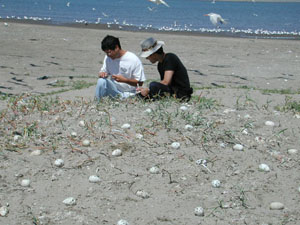Where Are the Birds?
From http://shorebirds.pwnet.org/migration/sinaloa.htm
Where is Santa Maria Bay in Sinaloa, Mexico?
Sinaloa, one of the 32 states of Mexico, is located on the northwest coast long the southern Gulf of California. To the north is the state of Sonora (which borders the U.S.) and to the south is Nayarit. On the east are the states of Durango and Chihuahua with the Sierra Madre Mountains. Sinaloa is famous for its natural beauty with tropical beaches, rain forests, and great coastal wetlands with large lagoons and mangroves. If you've enjoyed fresh mangoes, tomatoes, cucumbers, or sweet peppers in the winter, they may have come from Sinaloa!
What are the wetlands like at Santa Maria Bay?
Santa Maria Bay, recognized as one of the country's most important wetlands by the government of Mexico, is a large coastal lagoon in western Sinaloa made up of dense flooded mangrove forests and extensive open tidal mud flats. The Bay provides important wetland habitats for millions of birds, including ducks, pelicans, herons, gulls, terns, and, of course, shorebirds by the thousands. Also, there are approximately 60,000 people living around the Bay in 10 principal communities. Primary economic activities are agriculture, fishing, and shrimp farming.
Why is Santa Maria Bay so important to shorebirds?
At least 1/3 of all the Pacific flyway shorebirds spend their winter in the Bay area (almost one million shorebirds!) plus many thousands more use it as a stopover on their way to and from Panama and South America. There is no other wetland of this size or quality along the entire west coast of Mexico so shorebirds really depend on this site for their habitat.
What other wildlife use the Santa Maria Bay wetlands?
Almost one-half of the 1,018 bird species of Mexico can be found in Sinaloa, including beautiful exotic birds like the blue-footed booby, elegant terns, and brown pelicans. Offshore from the Bay are the famous waters where the Gray Whales spend the winter with their newborn "calves."
 Join In
Join In Archives
Archives